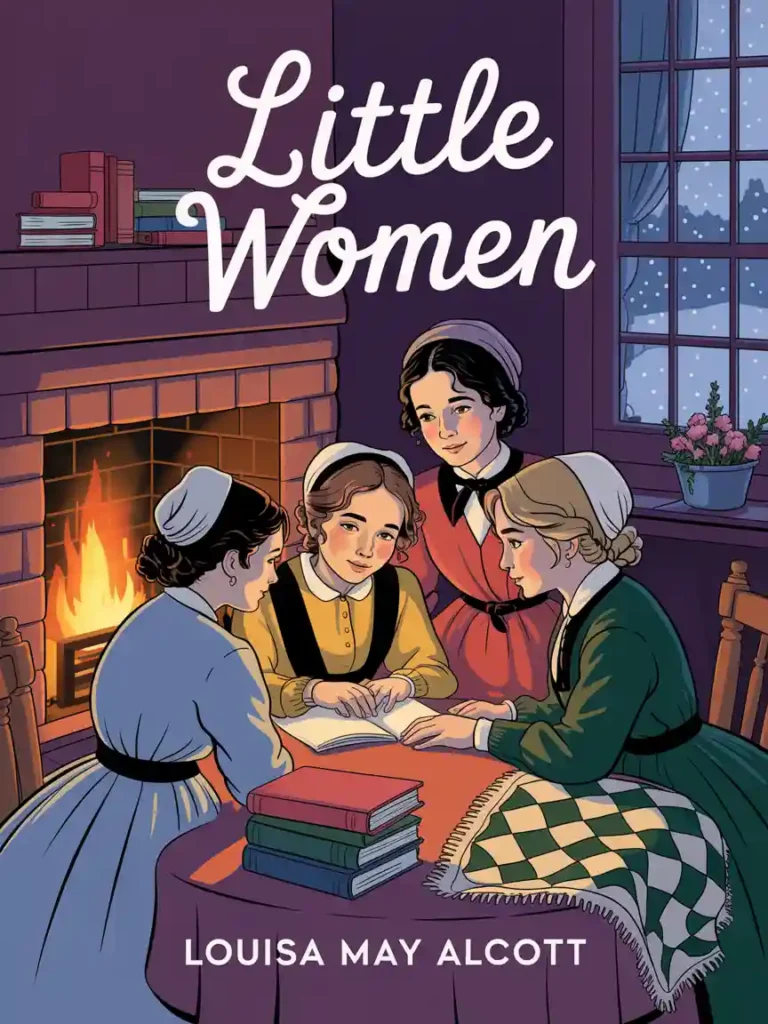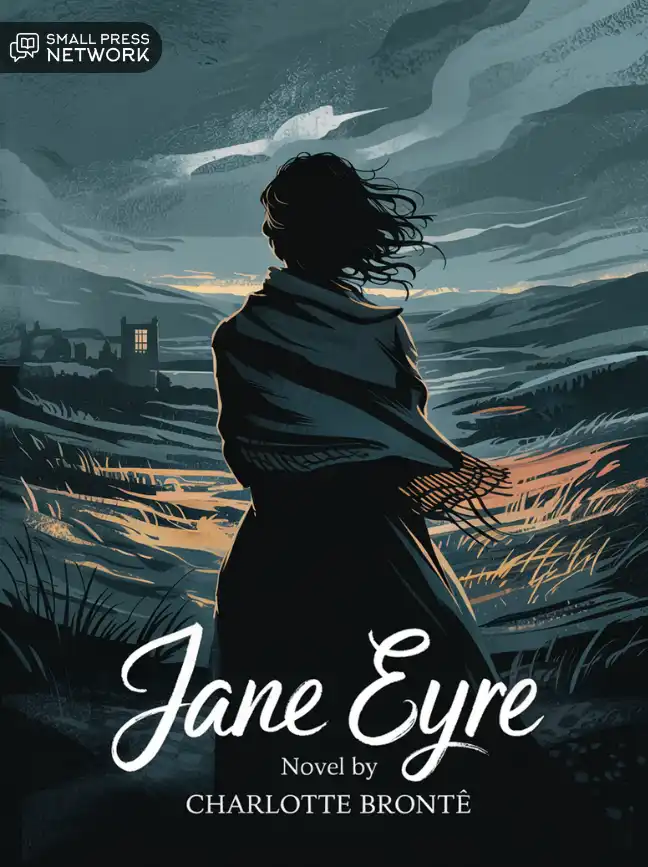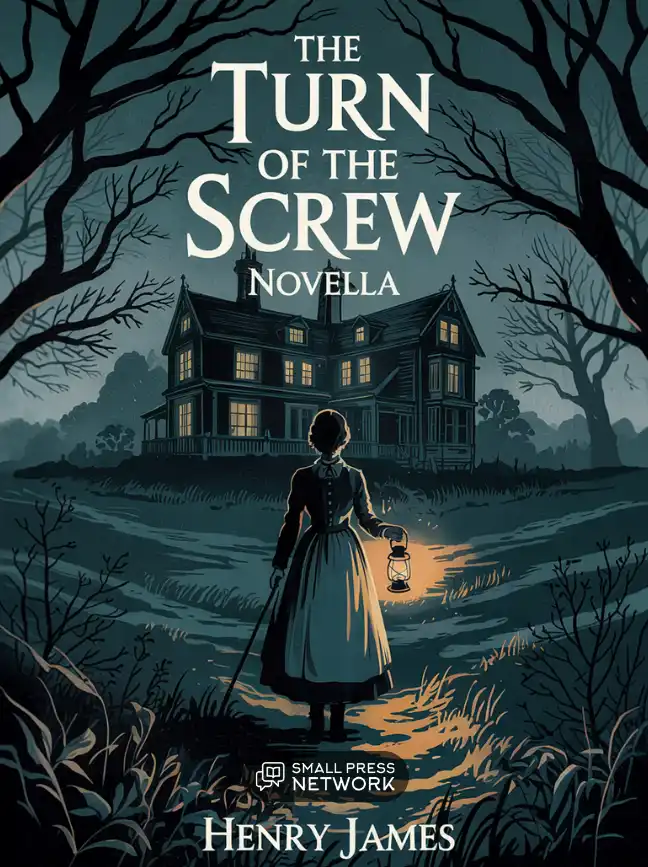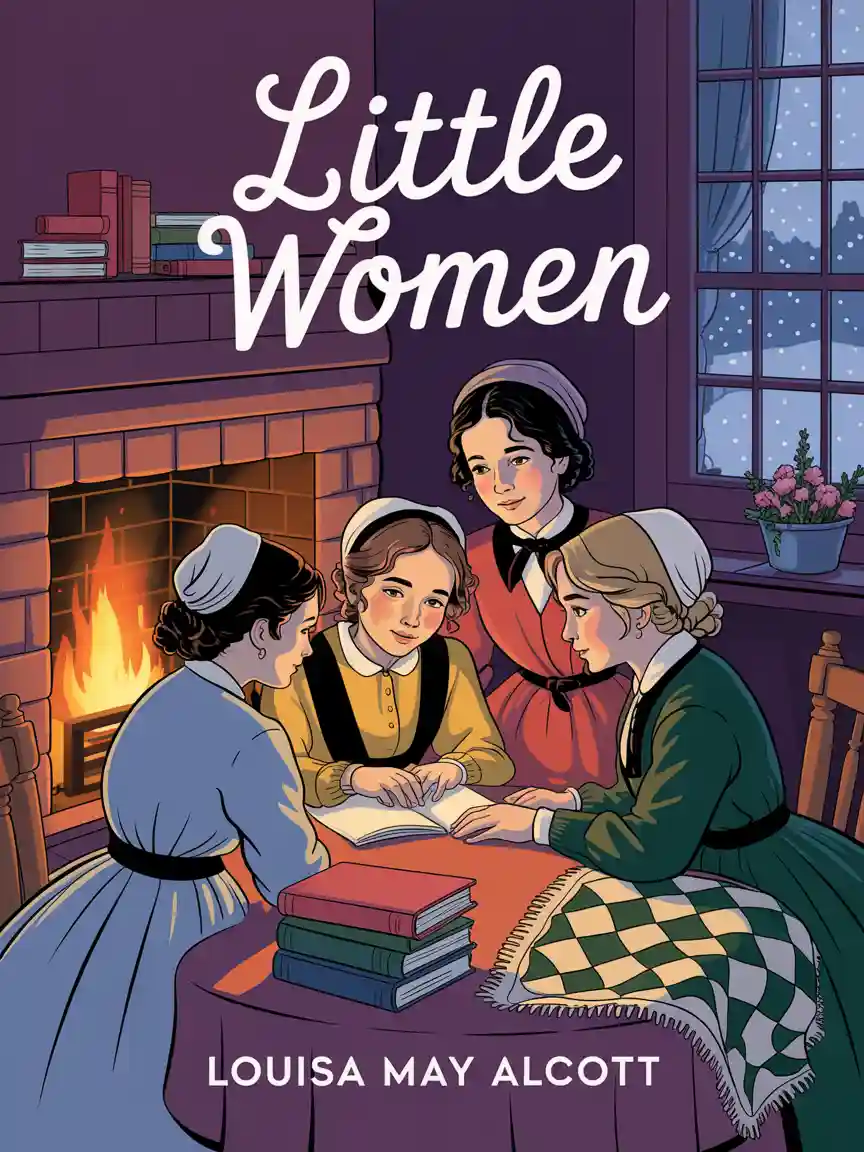CHAPTER FIFTEEN
A TELEGRAM
“November is the most disagreeable month in the whole year,” said
Margaret, standing at the window one dull afternoon, looking out at the
frostbitten garden.
“That’s the reason I was born in it,” observed Jo pensively, quite
unconscious of the blot on her nose.
“If something very pleasant should happen now, we should think it a
delightful month,” said Beth, who took a hopeful view of everything, even
November.
“I dare say, but nothing pleasant ever does happen in this family,” said
Meg, who was out of sorts. “We go grubbing along day after day, without a
bit of change, and very little fun. We might as well be in a treadmill.”
“My patience, how blue we are!” cried Jo. “I don’t much wonder, poor
dear, for you see other girls having splendid times, while you grind, grind,
year in and year out. Oh, don’t I wish I could manage things for you as I do
for my heroines! You’re pretty enough and good enough already, so I’d
have some rich relation leave you a fortune unexpectedly. Then you’d dash
out as an heiress, scorn everyone who has slighted you, go abroad, and
come home my Lady Something in a blaze of splendor and elegance.”
“People don’t have fortunes left them in that style nowadays, men have
to work and women marry for money. It’s a dreadfully unjust world,” said
Meg bitterly.
“Jo and I are going to make fortunes for you all. Just wait ten years, and
see if we don’t,” said Amy, who sat in a corner making mud pies, as Hannah
called her little clay models of birds, fruit, and faces.
“Can’t wait, and I’m afraid I haven’t much faith in ink and dirt, though
I’m grateful for your good intentions.”
Meg sighed, and turned to the frostbitten garden again. Jo groaned and
leaned both elbows on the table in a despondent attitude, but Amy spatted
away energetically, and Beth, who sat at the other window, said, smiling,
“Two pleasant things are going to happen right away. Marmee is coming
down the street, and Laurie is tramping through the garden as if he had
something nice to tell.”
In they both came, Mrs. March with her usual question, “Any letter from
Father, girls?” and Laurie to say in his persuasive way, “Won’t some of you
come for a drive? I’ve been working away at mathematics till my head is in
a muddle, and I’m going to freshen my wits by a brisk turn. It’s a dull day,
but the air isn’t bad, and I’m going to take Brooke home, so it will be gay
inside, if it isn’t out. Come, Jo, you and Beth will go, won’t you?”
“Of course we will.”
“Much obliged, but I’m busy.” And Meg whisked out her workbasket, for
she had agreed with her mother that it was best, for her at least, not to drive
too often with the young gentleman.
“We three will be ready in a minute,” cried Amy, running away to wash
her hands.
“Can I do anything for you, Madam Mother?” asked Laurie, leaning over
Mrs. March’s chair with the affectionate look and tone he always gave her.
“No, thank you, except call at the office, if you’ll be so kind, dear. It’s
our day for a letter, and the postman hasn’t been. Father is as regular as the
sun, but there’s some delay on the way, perhaps.”
A sharp ring interrupted her, and a minute after Hannah came in with a
letter.
“It’s one of them horrid telegraph things, mum,” she said, handling it as
if she was afraid it would explode and do some damage.
At the word ‘telegraph’, Mrs. March snatched it, read the two lines it
contained, and dropped back into her chair as white as if the little paper had
sent a bullet to her heart. Laurie dashed downstairs for water, while Meg
and Hannah supported her, and Jo read aloud, in a frightened voice…
Mrs. March:
Your husband is very ill. Come at once.
S. HALE
Blank Hospital, Washington.
How still the room was as they listened breathlessly, how strangely the
day darkened outside, and how suddenly the whole world seemed to
change, as the girls gathered about their mother, feeling as if all the
happiness and support of their lives was about to be taken from them.
Mrs. March was herself again directly, read the message over, and
stretched out her arms to her daughters, saying, in a tone they never forgot,
“I shall go at once, but it may be too late. Oh, children, children, help me to
bear it!”
For several minutes there was nothing but the sound of sobbing in the
room, mingled with broken words of comfort, tender assurances of help,
and hopeful whispers that died away in tears. Poor Hannah was the first to
recover, and with unconscious wisdom she set all the rest a good example,
for with her, work was panacea for most afflictions.
“The Lord keep the dear man! I won’t waste no time a-cryin’, but git
your things ready right away, mum,” she said heartily, as she wiped her face
on her apron, gave her mistress a warm shake of the hand with her own
hard one, and went away to work like three women in one.
“She’s right, there’s no time for tears now. Be calm, girls, and let me
think.”
They tried to be calm, poor things, as their mother sat up, looking pale
but steady, and put away her grief to think and plan for them.
“Where’s Laurie?” she asked presently, when she had collected her
thoughts and decided on the first duties to be done.
“Here, ma’am. Oh, let me do something!” cried the boy, hurrying from
the next room whither he had withdrawn, feeling that their first sorrow was
too sacred for even his friendly eyes to see.
“Send a telegram saying I will come at once. The next train goes early in
the morning. I’ll take that.”
“What else? The horses are ready. I can go anywhere, do anything,” he
said, looking ready to fly to the ends of the earth.
“Leave a note at Aunt March’s. Jo, give me that pen and paper.”
Tearing off the blank side of one of her newly copied pages, Jo drew the
table before her mother, well knowing that money for the long, sad journey
must be borrowed, and feeling as if she could do anything to add a little to
the sum for her father.
“Now go, dear, but don’t kill yourself driving at a desperate pace. There
is no need of that.”
Mrs. March’s warning was evidently thrown away, for five minutes later
Laurie tore by the window on his own fleet horse, riding as if for his life.
“Jo, run to the rooms, and tell Mrs. King that I can’t come. On the way
get these things. I’ll put them down, they’ll be needed and I must go
prepared for nursing. Hospital stores are not always good. Beth, go and ask
Mr. Laurence for a couple of bottles of old wine. I’m not too proud to beg
for Father. He shall have the best of everything. Amy, tell Hannah to get
down the black trunk, and Meg, come and help me find my things, for I’m
half bewildered.”
Writing, thinking, and directing all at once might well bewilder the poor
lady, and Meg begged her to sit quietly in her room for a little while, and let
them work. Everyone scattered like leaves before a gust of wind, and the
quiet, happy household was broken up as suddenly as if the paper had been
an evil spell.
Mr. Laurence came hurrying back with Beth, bringing every comfort the
kind old gentleman could think of for the invalid, and friendliest promises
of protection for the girls during the mother’s absence, which comforted her
very much. There was nothing he didn’t offer, from his own dressing gown
to himself as escort. But the last was impossible. Mrs. March would not
hear of the old gentleman’s undertaking the long journey, yet an expression
of relief was visible when he spoke of it, for anxiety ill fits one for
traveling. He saw the look, knit his heavy eyebrows, rubbed his hands, and
marched abruptly away, saying he’d be back directly. No one had time to
think of him again till, as Meg ran through the entry, with a pair of rubbers
in one hand and a cup of tea in the other, she came suddenly upon Mr.
Brooke.
“I’m very sorry to hear of this, Miss March,” he said, in the kind, quiet
tone which sounded very pleasantly to her perturbed spirit. “I came to offer
myself as escort to your mother. Mr. Laurence has commissions for me in
Washington, and it will give me real satisfaction to be of service to her
there.”
Down dropped the rubbers, and the tea was very near following, as Meg
put out her hand, with a face so full of gratitude that Mr. Brooke would
have felt repaid for a much greater sacrifice than the trifling one of time and
comfort which he was about to take.
“How kind you all are! Mother will accept, I’m sure, and it will be such a
relief to know that she has someone to take care of her. Thank you very,
very much!”
Meg spoke earnestly, and forgot herself entirely till something in the
brown eyes looking down at her made her remember the cooling tea, and
lead the way into the parlor, saying she would call her mother.
Everything was arranged by the time Laurie returned with a note from
Aunt March, enclosing the desired sum, and a few lines repeating what she
had often said before, that she had always told them it was absurd for
March to go into the army, always predicted that no good would come of it,
and she hoped they would take her advice the next time. Mrs. March put the
note in the fire, the money in her purse, and went on with her preparations,
with her lips folded tightly in a way which Jo would have understood if she
had been there.
The short afternoon wore away. All other errands were done, and Meg
and her mother busy at some necessary needlework, while Beth and Amy
got tea, and Hannah finished her ironing with what she called a ‘slap and a
bang’, but still Jo did not come. They began to get anxious, and Laurie went
off to find her, for no one knew what freak Jo might take into her head. He
missed her, however, and she came walking in with a very queer expression
of countenance, for there was a mixture of fun and fear, satisfaction and
regret in it, which puzzled the family as much as did the roll of bills she laid
before her mother, saying with a little choke in her voice, “That’s my
contribution toward making Father comfortable and bringing him home!”
“My dear, where did you get it? Twenty-five dollars! Jo, I hope you
haven’t done anything rash?”
“No, it’s mine honestly. I didn’t beg, borrow, or steal it. I earned it, and I
don’t think you’ll blame me, for I only sold what was my own.”
As she spoke, Jo took off her bonnet, and a general outcry arose, for all
her abundant hair was cut short.
“Your hair! Your beautiful hair!” “Oh, Jo, how could you? Your one
beauty.” “My dear girl, there was no need of this.” “She doesn’t look like
my Jo any more, but I love her dearly for it!”
As everyone exclaimed, and Beth hugged the cropped head tenderly, Jo
assumed an indifferent air, which did not deceive anyone a particle, and
said, rumpling up the brown bush and trying to look as if she liked it, “It
doesn’t affect the fate of the nation, so don’t wail, Beth. It will be good for
my vanity, I was getting too proud of my wig. It will do my brains good to
have that mop taken off. My head feels deliciously light and cool, and the
barber said I could soon have a curly crop, which will be boyish, becoming,
and easy to keep in order. I’m satisfied, so please take the money and let’s
have supper.”
“Tell me all about it, Jo. I am not quite satisfied, but I can’t blame you,
for I know how willingly you sacrificed your vanity, as you call it, to your
love. But, my dear, it was not necessary, and I’m afraid you will regret it
one of these days,” said Mrs. March.
“No, I won’t!” returned Jo stoutly, feeling much relieved that her prank
was not entirely condemned.
“What made you do it?” asked Amy, who would as soon have thought of
cutting off her head as her pretty hair.
“Well, I was wild to do something for Father,” replied Jo, as they
gathered about the table, for healthy young people can eat even in the midst
of trouble. “I hate to borrow as much as Mother does, and I knew Aunt
March would croak, she always does, if you ask for a ninepence. Meg gave
all her quarterly salary toward the rent, and I only got some clothes with
mine, so I felt wicked, and was bound to have some money, if I sold the
nose off my face to get it.”
“You needn’t feel wicked, my child! You had no winter things and got the
simplest with your own hard earnings,” said Mrs. March with a look that
warmed Jo’s heart.
“I hadn’t the least idea of selling my hair at first, but as I went along I
kept thinking what I could do, and feeling as if I’d like to dive into some of
the rich stores and help myself. In a barber’s window I saw tails of hair with
the prices marked, and one black tail, not so thick as mine, was forty
dollars. It came to me all of a sudden that I had one thing to make money
out of, and without stopping to think, I walked in, asked if they bought hair,
and what they would give for mine.”
“I don’t see how you dared to do it,” said Beth in a tone of awe.
“Oh, he was a little man who looked as if he merely lived to oil his hair.
He rather stared at first, as if he wasn’t used to having girls bounce into his
shop and ask him to buy their hair. He said he didn’t care about mine, it
wasn’t the fashionable color, and he never paid much for it in the first place.
The work put into it made it dear, and so on. It was getting late, and I was
afraid if it wasn’t done right away that I shouldn’t have it done at all, and
you know when I start to do a thing, I hate to give it up. So I begged him to
take it, and told him why I was in such a hurry. It was silly, I dare say, but it
changed his mind, for I got rather excited, and told the story in my topsy-
turvy way, and his wife heard, and said so kindly, ‘Take it, Thomas, and
oblige the young lady. I’d do as much for our Jimmy any day if I had a spire
of hair worth selling.”
“Who was Jimmy?” asked Amy, who liked to have things explained as
they went along.
“Her son, she said, who was in the army. How friendly such things make
strangers feel, don’t they? She talked away all the time the man clipped, and
diverted my mind nicely.”
“Didn’t you feel dreadfully when the first cut came?” asked Meg, with a
shiver.
“I took a last look at my hair while the man got his things, and that was
the end of it. I never snivel over trifles like that. I will confess, though, I felt
queer when I saw the dear old hair laid out on the table, and felt only the
short rough ends of my head. It almost seemed as if I’d an arm or leg off.
The woman saw me look at it, and picked out a long lock for me to keep.
I’ll give it to you, Marmee, just to remember past glories by, for a crop is so
comfortable I don’t think I shall ever have a mane again.”
Mrs. March folded the wavy chestnut lock, and laid it away with a short
gray one in her desk. She only said, “Thank you, deary,” but something in
her face made the girls change the subject, and talk as cheerfully as they
could about Mr. Brooke’s kindness, the prospect of a fine day tomorrow,
and the happy times they would have when Father came home to be nursed.
No one wanted to go to bed when at ten o’clock Mrs. March put by the
last finished job, and said, “Come girls.” Beth went to the piano and played
the father’s favorite hymn. All began bravely, but broke down one by one
till Beth was left alone, singing with all her heart, for to her music was
always a sweet consoler.
“Go to bed and don’t talk, for we must be up early and shall need all the
sleep we can get. Good night, my darlings,” said Mrs. March, as the hymn
ended, for no one cared to try another.
They kissed her quietly, and went to bed as silently as if the dear invalid
lay in the next room. Beth and Amy soon fell asleep in spite of the great
trouble, but Meg lay awake, thinking the most serious thoughts she had ever
known in her short life. Jo lay motionless, and her sister fancied that she
was asleep, till a stifled sob made her exclaim, as she touched a wet cheek…
“Jo, dear, what is it? Are you crying about father?”
“No, not now.”
“What then?”
“My… My hair!” burst out poor Jo, trying vainly to smother her emotion
in the pillow.
It did not seem at all comical to Meg, who kissed and caressed the
afflicted heroine in the tenderest manner.
“I’m not sorry,” protested Jo, with a choke. “I’d do it again tomorrow, if I
could. It’s only the vain part of me that goes and cries in this silly way.
Don’t tell anyone, it’s all over now. I thought you were asleep, so I just
made a little private moan for my one beauty. How came you to be awake?”
“I can’t sleep, I’m so anxious,” said Meg.
“Think about something pleasant, and you’ll soon drop off.”
“I tried it, but felt wider awake than ever.”
“What did you think of?”
“Handsome faces—eyes particularly,” answered Meg, smiling to herself
in the dark.
“What color do you like best?”
“Brown, that is, sometimes. Blue are lovely.”
Jo laughed, and Meg sharply ordered her not to talk, then amiably
promised to make her hair curl, and fell asleep to dream of living in her
castle in the air.
The clocks were striking midnight and the rooms were very still as a
figure glided quietly from bed to bed, smoothing a coverlet here, settling a
pillow there, and pausing to look long and tenderly at each unconscious
face, to kiss each with lips that mutely blessed, and to pray the fervent
prayers which only mothers utter. As she lifted the curtain to look out into
the dreary night, the moon broke suddenly from behind the clouds and
shone upon her like a bright, benignant face, which seemed to whisper in
the silence, “Be comforted, dear soul! There is always light behind the
clouds.”





